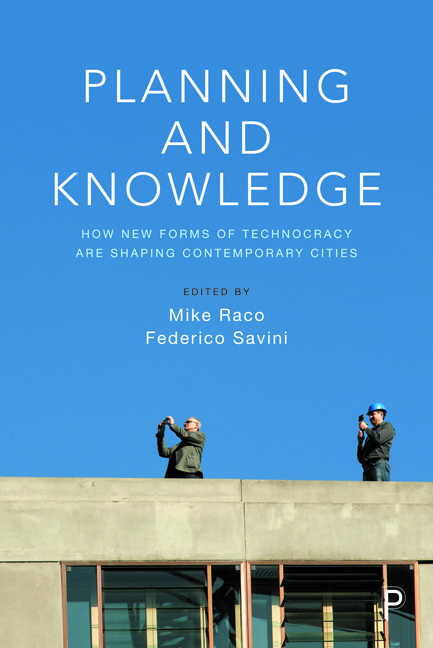Book contents
- Frontmatter
- Contents
- List of figures
- List of tables
- Notes on contributors
- Part I Conceptual framings of technocracy
- Part II Public planning and bureaucracies in contemporary urban development politics
- Part III Corporate knowledge and the land and property development sector
- Part IV Private consultants and the delivery of public policy
- Part V New constellations of actors and the management and governance of contemporary cities
- References
- Index
2 - Planning, knowledge and technocracy in historicalperspective
Published online by Cambridge University Press: 30 April 2022
- Frontmatter
- Contents
- List of figures
- List of tables
- Notes on contributors
- Part I Conceptual framings of technocracy
- Part II Public planning and bureaucracies in contemporary urban development politics
- Part III Corporate knowledge and the land and property development sector
- Part IV Private consultants and the delivery of public policy
- Part V New constellations of actors and the management and governance of contemporary cities
- References
- Index
Summary
Introduction
Fifty years ago, William Armytage opened his history ofthe rise of technocracy with the Homeric image ofLaocoön, the priest of Apollo who tried to convincehis fellow-citizens to reject the wooden horse leftby the Greeks outside the walls of Troy. Just as hewas making his case two serpents suddenly emergedfrom the sea and crushed him to death (Figure 2.1).Armytage comments: ‘similarly latent, butaggressive, social forces emerge from below the“social horizon” to confound historians’ (1965,vii).
Setting aside for the moment the question whetherthey’re an apt metaphor for technocracy, thoseserpents swimming below the surface certainly domatch the case of neoliberalism. Kim Phillips-Fein(2009) has shown how neo-conservative ideologueswere secretively bankrolled for decades by Americanbusinessmen and wealthy pro-marketeers. NancyMaclean (2017) has called the radical right agenda a‘stealth plan’. The programme for dismantling thewelfare state took shape below the social horizonuntil the 1980s, since when its offensive has beenabrupt, implacable and all-pervasive.Neo-conservatism has shifted the fundamentals ofsocial thought, enabling particularist knowledge toundermine the concepts of collective welfare andpublic interest. It has hollowed out theinstitutional apparatus of the nation-state andemptied the distinction between public and privatesectors. It has caused local governments to abandontime-honoured methods of accountability and embracequasi-corporate management structures andremuneration pyramids. The United Kingdom's localgovernment map has been repeatedly redrawn, almostalways in the direction of fewer, larger unitsdevoid of municipal identity. The extent of itssuccess could be measured by the extensivetermination of local public services in theaftermath of the 2008 banking crash: a process bestdescribed, as Tom Crewe notes, not in terms of‘cuts’ or ‘austerity’ but as the deliberatedestruction of an entire social infrastructure(2016: 7).
The neoliberal era has brought a fresh cast of actorsonto the stage with their own discourses, metrics,analytical techniques and modes of communication:examples discussed in this book include signaturearchitects (Ponzini), deal- makers (Taşan- Kok),development engineers (Metzger and Zakhour), housingspreadsheet consultants (Layard), fixers (Mössnerand Gomes de Matos), futurists (Weber), journalists(Livingstone), lobbyists (Hirvola and Mäntysalo),participation consultants (Brownill), scrutineers(Parker and Street), smart city experts (Kitchin andcolleagues).
- Type
- Chapter
- Information
- Planning and KnowledgeHow New Forms of Technocracy Are Shaping Contemporary Cities, pp. 19 - 30Publisher: Bristol University PressPrint publication year: 2019



